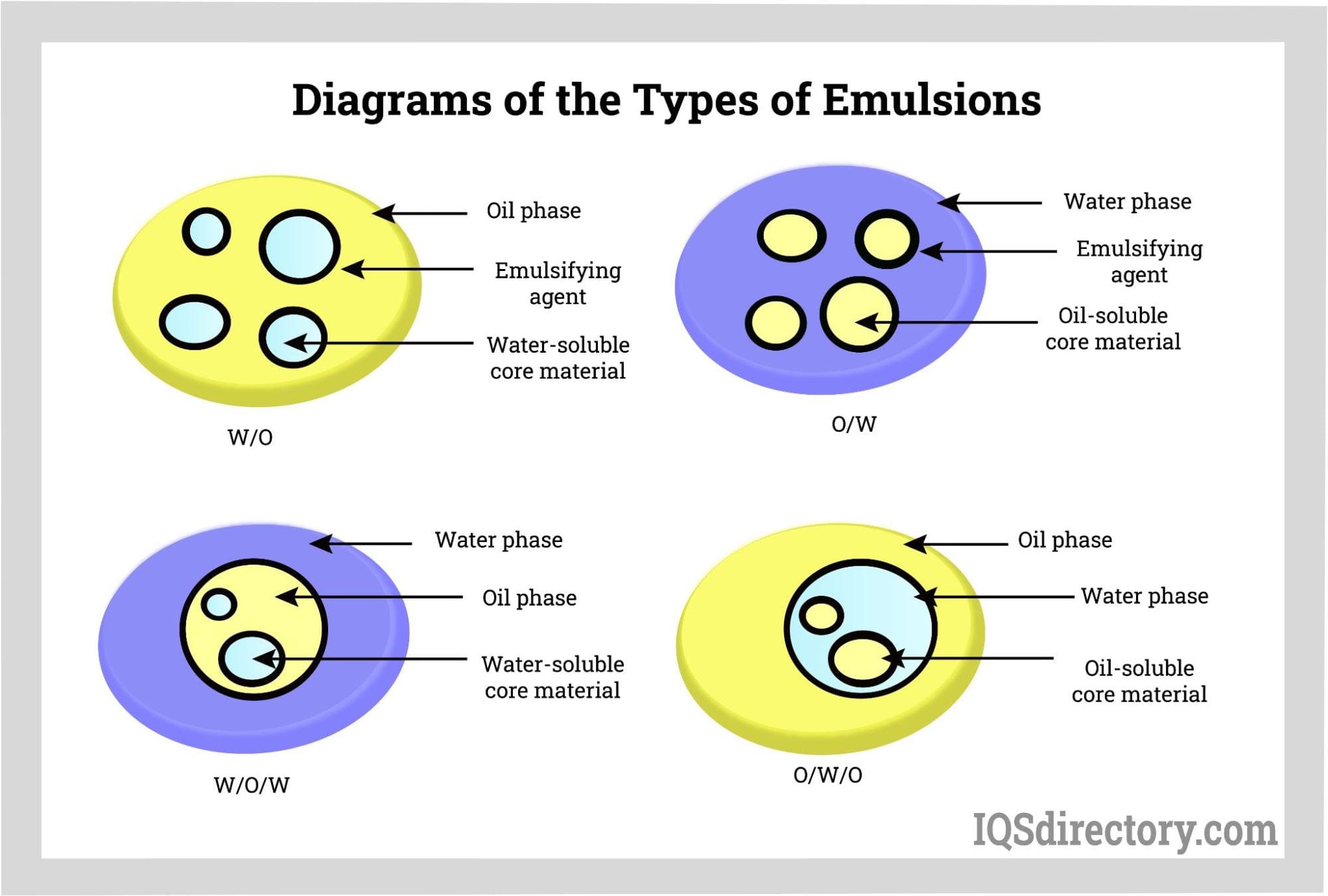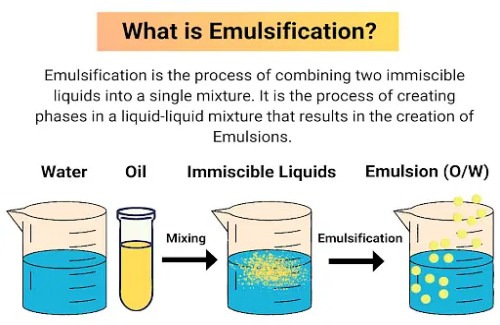The Scientific research Behind Emulsifiers and Their Value in Modern Production
Emulsifiers play a crucial duty in modern production, functioning as the unrecognized heroes that mix oil and water for a wide variety of items. You might not understand how these compounds improve texture and stability, however their influence is substantial throughout markets. As customer choices shift in the direction of cleaner tags, the need for cutting-edge emulsifiers is expanding. What does this mean for the future of item formulation? Let's explore better.
What Are Emulsifiers?
Emulsifiers are crucial agents in the globe of food and item manufacturing, acting as the glue that binds 2 otherwise immiscible liquids, like oil and water. Common examples include lecithin located in egg yolks and soybeans, and mono- and diglycerides used in numerous processed foods.

When you whip up a salad clothing or delight in a luscious treat, emulsifiers aid preserve that best appearance. Without emulsifiers, lots of foods would separate, leading to undesirable structures and flavors.
The Chemistry of Emulsification
When you mix oil and water, you could see they do not blend quickly; that's where the chemistry of emulsification comes right into play. To conquer this challenge, emulsifiers are used.
These molecules have a hydrophilic (water-attracting) head and a hydrophobic (water-repelling) tail. When you add an emulsifier, its particles position themselves at the oil-water interface, lowering surface area tension and permitting the droplets to mix. The emulsifier forms a safety layer around each droplet, stopping them from integrating back into separate layers. Comprehending this chemistry is vital for achieving security in items like dressings, creams, and sauces, making emulsification vital in modern production.
Sorts Of Emulsifiers
Numerous kinds of emulsifiers play crucial functions in maintaining blends of oil and water. You'll commonly come across 2 major classifications: all-natural and artificial emulsifiers. All-natural emulsifiers, like lecithin from egg yolks or soy, are originated from plants and animals, making them preferred in food products. They're generally thought about much safer and healthier choices.
On the various other hand, artificial emulsifiers, such as mono- and diglycerides, are chemically crafted to improve stability and service life. They're commonly made use of in processed foods and aesthetic products.
In addition, you might stumble upon non-ionic, anionic, and cationic emulsifiers, each with unique residential properties that impact their efficiency. Non-ionic emulsifiers, for instance, work well in a large array of pH levels, while anionic emulsifiers tend to carry out better in alkaline problems. Understanding these kinds can assist you pick the appropriate emulsifier for your certain application.
Mechanisms of Solution Formation
Understanding exactly how solutions create is vital for producing secure mixtures of oil and water. When you present an emulsifier, it reduces the surface tension between the 2 liquids, allowing them to blend more easily.
The emulsifier molecules have a hydrophilic (water-attracting) head and a hydrophobic (oil-attracting) tail. When you include an emulsifier, these molecules organize themselves at the oil-water interface. The hydrophilic heads communicate with water, while the hydrophobic tails anchor into the oil. This creates a barrier that stabilizes the droplets, avoiding them from coalescing.
Applications of Emulsifiers in Different Industries
Emulsifiers play a crucial role across various markets, making your preferred foods smoother and a lot more satisfying. In cosmetics, they boost item texture and stability, ensuring an enjoyable application experience. Plus, in pharmaceuticals, they help provide important components properly, boosting general effectiveness.
Food Industry Makes Use Of
While you might not understand it, emulsifiers play an essential duty in the food industry, boosting the structure, stability, and rack life of lots of products (Emulsifiers). They're frequently discovered in salad dressings, sauces, and mayonnaise, aiding to mix oil and water for a smooth, consistent item. In baked goods, emulsifiers boost dough handling and retain wetness, causing a far better appearance and extended freshness. They're additionally vital in dairy products, where they maintain solutions in lotions and ice lotions, preventing separation. Also in snacks, emulsifiers aid keep crunchiness and avoid stale flavors. By making certain harmony and high quality, emulsifiers are considerable to delivering the delicious items you delight in each day, making them an important active ingredient check my source in modern food manufacturing.
Cosmetic Formulations Advantages
When it involves aesthetic solutions, emulsifiers are essential for producing products that really feel extravagant and carry out properly. They aid blend oil and water, guaranteeing a smooth and stable uniformity in creams, lotions, and serums. You'll observe that emulsifiers improve product security, preventing separation and lengthening rack life. This suggests you can enjoy your preferred moisturizer without fretting about it spoiling too swiftly. In addition, emulsifiers improve the application experience, enabling for even distribution and far better absorption into the skin. By making use of emulsifiers, you also achieve an even more attractive appearance, making your cosmetics feel wonderful on your skin. In general, emulsifiers play a crucial function in delivering premium cosmetic items click for source that fulfill your appeal demands.
Pharmaceutical Applications Overview
In the pharmaceutical industry, emulsifiers are essential for developing reliable drugs. They aid develop secure combinations of oil and water, making sure that energetic ingredients are evenly distributed and conveniently soaked up by the body. You'll discover emulsifiers in different dose kinds, like creams, lotions, and liquid suspensions, improving the bioavailability of drugs. They also boost the texture and stability of items, making them more attractive and simpler to make use of.
The Impact of Emulsifiers on Item Quality

By guaranteeing secure solutions, you minimize the danger of putridity and extend rack life, ultimately conserving you money and time. You'll likewise find that emulsifiers can enhance the bioavailability of active components in your items, making them more reliable for customers.
Furthermore, they allow you to produce ingenious formulas that fulfill diverse customer demands. Whether you're crafting a velvety clothing or an extravagant lotion, emulsifiers are vital for attaining the desired outcomes. In brief, by understanding and leveraging the effect of emulsifiers, you can considerably raise the quality of your items.
Future Patterns in Emulsifier Advancement
As the need for cleaner tags and sustainable products climbs, the development of brand-new emulsifiers is set to progress substantially. You'll discover a shift in the direction of plant-based and natural emulsifiers, driven by customer preferences for ingredients that are eco-friendly and less processed. Advancements in biotechnology will likely improve the capability and efficiency of these emulsifiers, permitting producers to produce steady formulations with less ingredients.
You might additionally see a rise in multifunctional emulsifiers that not just stabilize emulsions but also improve flavor, structure, or dietary value. This fad might streamline active ingredient lists while improving product efficiency.
Furthermore, with advancements in nanotechnology, emulsifiers could be crafted at the molecular level to accomplish extraordinary security and efficiency. Emulsifiers. As you check out these patterns, you'll discover that the future of emulsifier advancement is not nearly capability, yet also regarding welcoming sustainability and openness in components
Regularly Asked Inquiries
Are Emulsifiers Safe for Intake in Food Products?
Yes, emulsifiers are typically risk-free for usage in food products. They have actually been extensively studied and approved by food security authorities, so you can enjoy your favorite foods without stressing over their influence on your health.
Can Emulsifiers Be Derived From All-natural Sources?
Yes, you can derive emulsifiers from all-natural resources. Components like lecithin from egg yolks or soybeans and casein from milk are common. These natural emulsifiers assist support blends without synthetic ingredients, making them preferred in different products.

Just How Do Emulsifiers Impact Rack Life of Products?
Emulsifiers maintain blends, preventing separation and putridity - Emulsifiers. By preserving uniformity, they extend items' service life, making sure quality and quality. You'll see that emulsifiers assist keep your preferred foods and cosmetics carrying out well over time
What Are Prospective Side Effects of Emulsifiers?
You could experience digestive system concerns when consuming items with emulsifiers, as they can website here interfere with digestive tract microorganisms. Some research studies suggest potential links to swelling or allergies, yet more research study is needed to fully recognize these impacts.

Are There Alternatives to Typical Emulsifiers?
Yes, there are options to conventional emulsifiers. You can discover options like natural gum tissues, starches, or lecithin. Each alternative offers unique homes, so experiment to discover what jobs best for your particular application.